牛津译林版八年级上册Unit 6 Bird watching第5课时教学课件(共19张PPT,内嵌音频)
文档属性
| 名称 | 牛津译林版八年级上册Unit 6 Bird watching第5课时教学课件(共19张PPT,内嵌音频) | 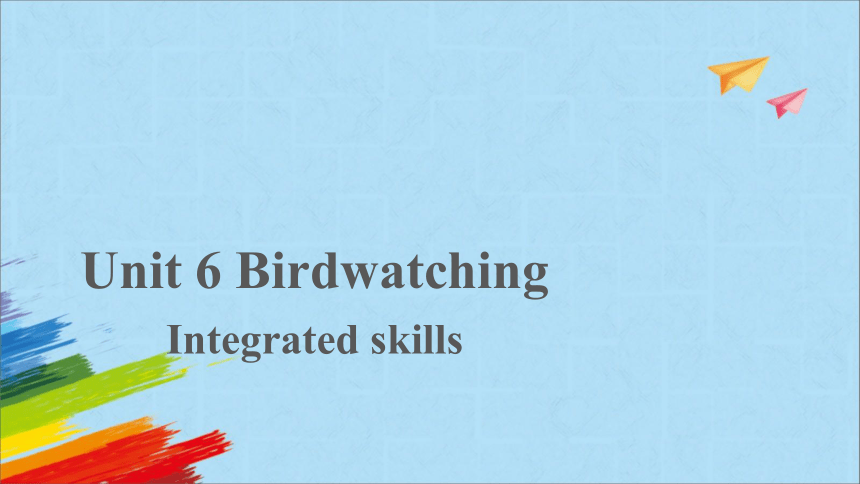 | |
| 格式 | pptx | ||
| 文件大小 | 4.5MB | ||
| 资源类型 | 教案 | ||
| 版本资源 | 牛津译林版 | ||
| 科目 | 英语 | ||
| 更新时间 | 2022-10-22 22:41:51 | ||
图片预览

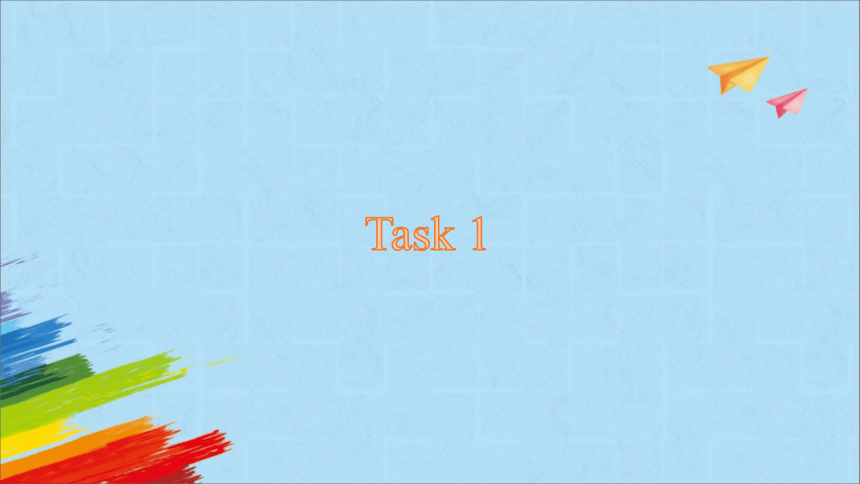
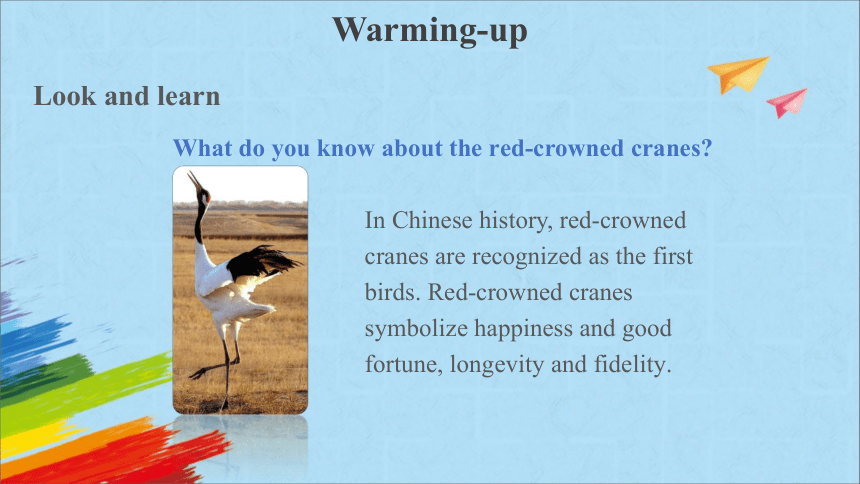
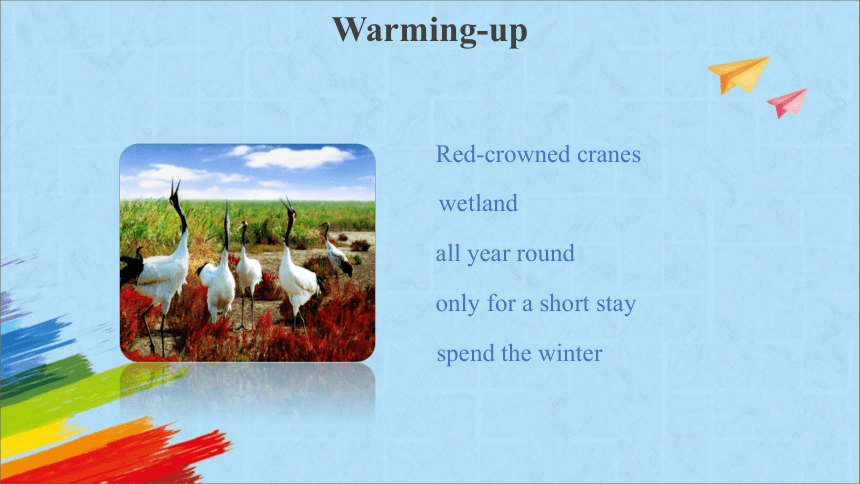
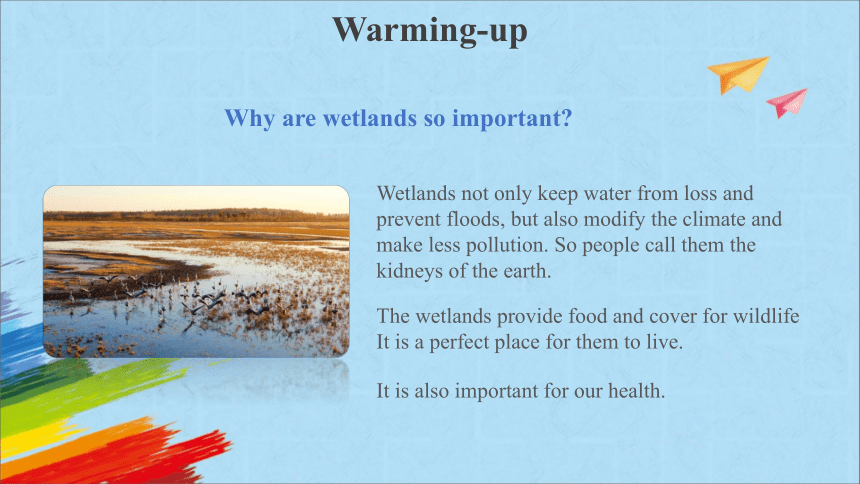
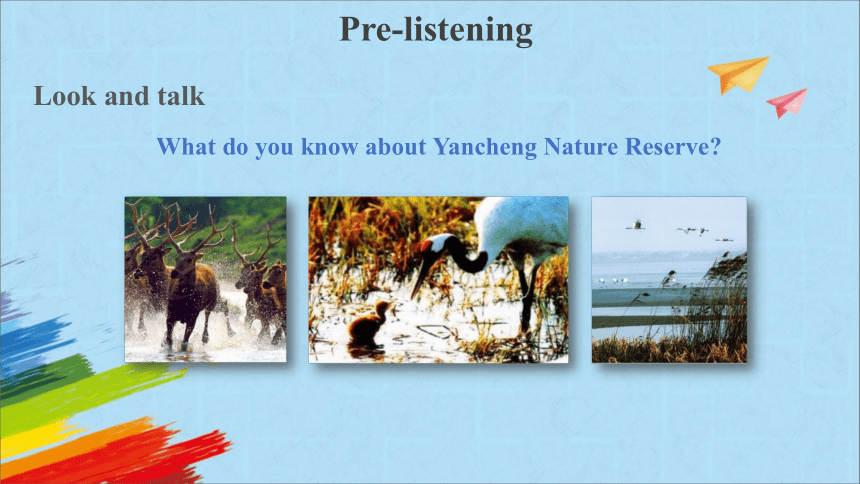
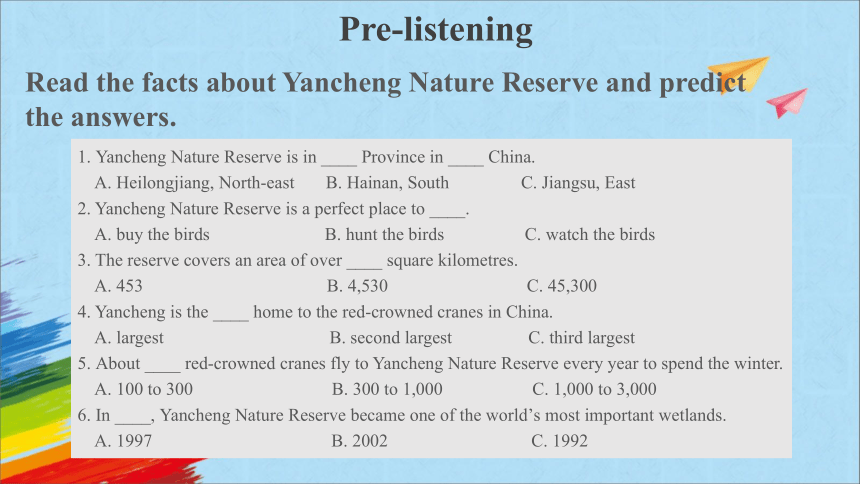
文档简介
(共19张PPT)
Unit 6 Birdwatching
Integrated skills
Task 1
In Chinese history, red-crowned cranes are recognized as the first birds. Red-crowned cranes symbolize happiness and good fortune, longevity and fidelity.
Warming-up
Look and learn
What do you know about the red-crowned cranes
Red-crowned cranes
wetland
all year round
only for a short stay
spend the winter
Warming-up
Why are wetlands so important
Wetlands not only keep water from loss and prevent floods, but also modify the climate and make less pollution. So people call them the kidneys of the earth.
The wetlands provide food and cover for wildlife
It is a perfect place for them to live.
It is also important for our health.
Warming-up
Pre-listening
What do you know about Yancheng Nature Reserve
Look and talk
1. Yancheng Nature Reserve is in ____ Province in ____ China.
A. Heilongjiang, North-east B. Hainan, South C. Jiangsu, East
2. Yancheng Nature Reserve is a perfect place to ____.
A. buy the birds B. hunt the birds C. watch the birds
3. The reserve covers an area of over ____ square kilometres.
A. 453 B. 4,530 C. 45,300
4. Yancheng is the ____ home to the red-crowned cranes in China.
A. largest B. second largest C. third largest
5. About ____ red-crowned cranes fly to Yancheng Nature Reserve every year to spend the winter.
A. 100 to 300 B. 300 to 1,000 C. 1,000 to 3,000
6. In ____, Yancheng Nature Reserve became one of the world’s most important wetlands.
A. 1997 B. 2002 C. 1992
Read the facts about Yancheng Nature Reserve and predict the answers.
Pre-listening
1. Yancheng Nature Reserve is in ____ Province in ____ China.
A. Heilongjiang, North-east B. Hainan, South C. Jiangsu, East
2. Yancheng Nature Reserve is a perfect place to ____.
A. buy the birds B. hunt the birds C. watch the birds
3. The reserve covers an area of over ____ square kilometres.
A. 453 B. 4,530 C. 45,300
4. Yancheng is the ____ home to the red-crowned cranes in China.
A. largest B. second largest C. third largest
5. About ____ red-crowned cranes fly to Yancheng Nature Reserve every year to spend the winter.
A. 100 to 300 B. 300 to 1,000 C. 1,000 to 3,000
6. In ____, Yancheng Nature Reserve became one of the world’s most important wetlands.
A. 1997 B. 2002 C. 1992
While-listening
Listen and check
Yancheng Nature Reserve is in Jiangsu Province in _____China. It covers an area of over _______ square kilometres. It became one of the world’s most important wetlands in ______.
Yancheng Nature Reserve is home to different kinds of plants and rare birds. There are not many ___________________ in the world, but there are some in Yancheng Nature Reserve. It is a perfect place to go _____________.
People celebrate the World Wetlands Day on __________ each year. We should protect the wetlands not only because they are home to many plants, birds and ________, but also because they are important to the _______ of people all over the world.
East
4,530
2002
red-crowned cranes
birdwatching
2 February
animals
health
Listen and complete the passage
While-listening
facts
Where
How big
What to do
Whose home
How important
4,530 km
in Jiangsu Province
in East China
cover an area of over 4,530 square kilometres
the home to
birds, plants…
a perfect place to go birdwatching
Most important wetland not only the home to … But also important for …
Think and introduce Yancheng Nature Reserve.
Post-listening
Task 2
binoculars
We need a pair of binoculars.
They can help us see clearly.
I want to go to the Yancheng Nature Reserve.
What should I take with me
Pre-listening
Think and learn
What to take Why
Listen and find out what Daniel needs to take and why.
help him see the birds more clearly
he may get thirsty
a pair of binoculars
some water
a notebook
write down what he sees
While-listening
Daniel: What should we take with us when we go birdwatching, Sandy
Sandy: You’d better take a pair of binoculars. They will help
you see the birds more clearly.
Daniel: OK. What else should we take
Sandy: You should take some water. Usually it takes hours to watch the
birds. You may get thirsty.
Daniel: All right. Anything else
Sandy: Take a notebook with you to write down what you see.
Daniel: OK. Thanks, Sandy.
Post-listening
Listen and read the dialogue aloud.
Think about the question and give your advice.
You’d better (not) … because …
You should … because …
Post-listening
I want to go to Yancheng Nature Reserve to go birdwatching.
What should I take with me
Make up dialogues in pairs.
A: What should we take with us when we go on a school trip/go to…
B: You’d better take a camera/… You can take some beautiful pictures/…
A: OK. What else should we take
B: You should… It’s a long walk/… You may…
A: All right. Anything else
B: Take a mobile phone with you/… You may need help if you get lost/…
A: That’s good idea. Thank you very much.
Post-listening
Summary
Key words and phrase:
cover, clearly, cover an area of
Key sentences:
The reserve covers an area of over 4,530 square kilometers.
You’d better take a pair of binoculars.
Homework
1. Read the dialogue in Speak up and recite it.
2. Write to introduce your favourite reserve and give your advice
about how to go there.
3. Preview Study skills.
Thank you!
Unit 6 Birdwatching
Integrated skills
Task 1
In Chinese history, red-crowned cranes are recognized as the first birds. Red-crowned cranes symbolize happiness and good fortune, longevity and fidelity.
Warming-up
Look and learn
What do you know about the red-crowned cranes
Red-crowned cranes
wetland
all year round
only for a short stay
spend the winter
Warming-up
Why are wetlands so important
Wetlands not only keep water from loss and prevent floods, but also modify the climate and make less pollution. So people call them the kidneys of the earth.
The wetlands provide food and cover for wildlife
It is a perfect place for them to live.
It is also important for our health.
Warming-up
Pre-listening
What do you know about Yancheng Nature Reserve
Look and talk
1. Yancheng Nature Reserve is in ____ Province in ____ China.
A. Heilongjiang, North-east B. Hainan, South C. Jiangsu, East
2. Yancheng Nature Reserve is a perfect place to ____.
A. buy the birds B. hunt the birds C. watch the birds
3. The reserve covers an area of over ____ square kilometres.
A. 453 B. 4,530 C. 45,300
4. Yancheng is the ____ home to the red-crowned cranes in China.
A. largest B. second largest C. third largest
5. About ____ red-crowned cranes fly to Yancheng Nature Reserve every year to spend the winter.
A. 100 to 300 B. 300 to 1,000 C. 1,000 to 3,000
6. In ____, Yancheng Nature Reserve became one of the world’s most important wetlands.
A. 1997 B. 2002 C. 1992
Read the facts about Yancheng Nature Reserve and predict the answers.
Pre-listening
1. Yancheng Nature Reserve is in ____ Province in ____ China.
A. Heilongjiang, North-east B. Hainan, South C. Jiangsu, East
2. Yancheng Nature Reserve is a perfect place to ____.
A. buy the birds B. hunt the birds C. watch the birds
3. The reserve covers an area of over ____ square kilometres.
A. 453 B. 4,530 C. 45,300
4. Yancheng is the ____ home to the red-crowned cranes in China.
A. largest B. second largest C. third largest
5. About ____ red-crowned cranes fly to Yancheng Nature Reserve every year to spend the winter.
A. 100 to 300 B. 300 to 1,000 C. 1,000 to 3,000
6. In ____, Yancheng Nature Reserve became one of the world’s most important wetlands.
A. 1997 B. 2002 C. 1992
While-listening
Listen and check
Yancheng Nature Reserve is in Jiangsu Province in _____China. It covers an area of over _______ square kilometres. It became one of the world’s most important wetlands in ______.
Yancheng Nature Reserve is home to different kinds of plants and rare birds. There are not many ___________________ in the world, but there are some in Yancheng Nature Reserve. It is a perfect place to go _____________.
People celebrate the World Wetlands Day on __________ each year. We should protect the wetlands not only because they are home to many plants, birds and ________, but also because they are important to the _______ of people all over the world.
East
4,530
2002
red-crowned cranes
birdwatching
2 February
animals
health
Listen and complete the passage
While-listening
facts
Where
How big
What to do
Whose home
How important
4,530 km
in Jiangsu Province
in East China
cover an area of over 4,530 square kilometres
the home to
birds, plants…
a perfect place to go birdwatching
Most important wetland not only the home to … But also important for …
Think and introduce Yancheng Nature Reserve.
Post-listening
Task 2
binoculars
We need a pair of binoculars.
They can help us see clearly.
I want to go to the Yancheng Nature Reserve.
What should I take with me
Pre-listening
Think and learn
What to take Why
Listen and find out what Daniel needs to take and why.
help him see the birds more clearly
he may get thirsty
a pair of binoculars
some water
a notebook
write down what he sees
While-listening
Daniel: What should we take with us when we go birdwatching, Sandy
Sandy: You’d better take a pair of binoculars. They will help
you see the birds more clearly.
Daniel: OK. What else should we take
Sandy: You should take some water. Usually it takes hours to watch the
birds. You may get thirsty.
Daniel: All right. Anything else
Sandy: Take a notebook with you to write down what you see.
Daniel: OK. Thanks, Sandy.
Post-listening
Listen and read the dialogue aloud.
Think about the question and give your advice.
You’d better (not) … because …
You should … because …
Post-listening
I want to go to Yancheng Nature Reserve to go birdwatching.
What should I take with me
Make up dialogues in pairs.
A: What should we take with us when we go on a school trip/go to…
B: You’d better take a camera/… You can take some beautiful pictures/…
A: OK. What else should we take
B: You should… It’s a long walk/… You may…
A: All right. Anything else
B: Take a mobile phone with you/… You may need help if you get lost/…
A: That’s good idea. Thank you very much.
Post-listening
Summary
Key words and phrase:
cover, clearly, cover an area of
Key sentences:
The reserve covers an area of over 4,530 square kilometers.
You’d better take a pair of binoculars.
Homework
1. Read the dialogue in Speak up and recite it.
2. Write to introduce your favourite reserve and give your advice
about how to go there.
3. Preview Study skills.
Thank you!
